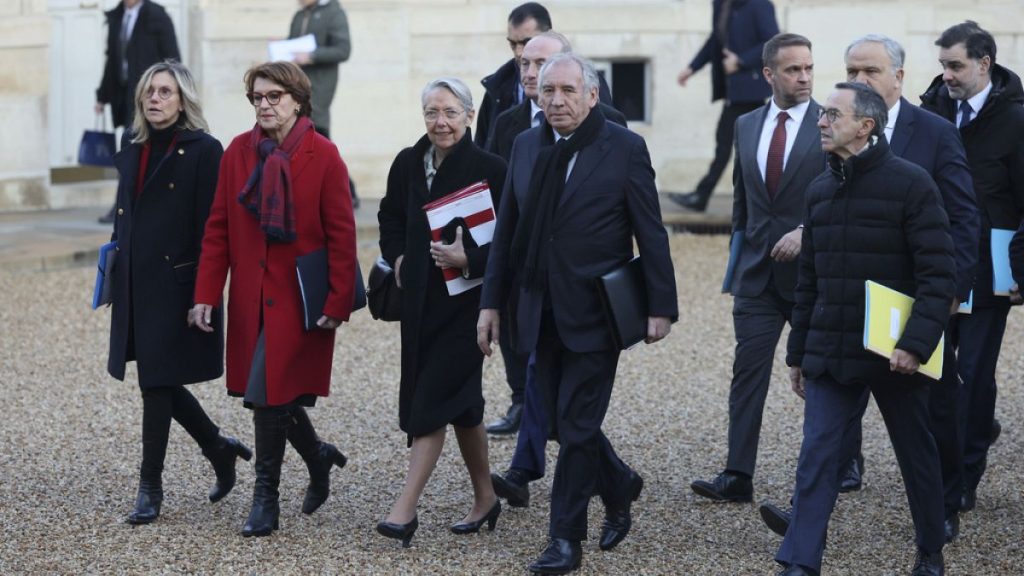The nascent French government, under the leadership of Prime Minister François Bayrou, finds itself navigating a complex political landscape marked by recent upheaval and pressing economic challenges. The immediate priority is the adoption of the 2025 budget, a critical step in addressing France’s fiscal situation and restoring stability after a period of political turbulence. President Emmanuel Macron, in his address to the newly formed Council of Ministers, emphasized the need for both boldness and stability, recognizing the delicate balance required to steer the nation forward. The government’s formation follows a major political crisis that culminated in the downfall of the previous administration led by Michel Barnier, underscoring the precarious political climate and the urgent need for decisive action.
The backdrop of this new government’s formation is a political landscape still reeling from the recent censure motion that toppled the previous government. This political upheaval, characterized by fractured majorities and the ascendance of extreme political factions, has created an atmosphere of uncertainty and necessitates a concerted effort to rebuild consensus and forge a path forward. Government spokeswoman Sophie Primas, in her address to the press, called for a collective shouldering of responsibility and a departure from rigid ideological positions. She emphasized the importance of constructive engagement and a willingness to transcend partisan divides to address the nation’s challenges, urging a focus on pragmatic solutions rather than obstructive tactics.
The government’s primary focus is the passage of the 2025 budget, a crucial element in stabilizing the nation’s finances and addressing the pressing issue of the public deficit. France faces significant pressure from various stakeholders, including international rating agencies, financial markets, and the European Commission, to adhere to EU budgetary regulations. The Stability and Growth Pact, which mandates a debt ceiling of 60% of GDP and a public deficit ceiling of 3% of GDP, serves as a critical benchmark for evaluating France’s fiscal health. The current public deficit stands at 6.1% of GDP, exceeding the stipulated limit, and the government aims to reduce it to 5.4% in 2025, a slightly less ambitious target than the 5% goal previously set by the former Prime Minister.
The challenge of reducing the public deficit is compounded by the aftermath of Cyclone Chido, which devastated the French overseas department of Mayotte. The government faces the dual imperative of addressing the immediate humanitarian needs of the affected population and fulfilling Prime Minister Bayrou’s commitment to provide substantial aid and reconstruction support. This necessitates careful allocation of resources and a strategic approach to balancing budgetary constraints with the urgent need for disaster relief and long-term recovery efforts in Mayotte.
The appointment of François Bayrou as Prime Minister on December 13, 2024, marked a pivotal moment in French politics, signaling a shift in leadership and a renewed focus on addressing the nation’s challenges. The subsequent formation of the new government, announced on December 23, 2024, represents an attempt to forge a stable and effective governing coalition capable of navigating the complex political and economic landscape. The composition of the new cabinet reflects the delicate balancing act required to secure parliamentary support and address the diverse interests of various political factions.
The Bayrou government inherits a nation grappling with both internal political divisions and external economic pressures. The task ahead is formidable, requiring a combination of decisive leadership, pragmatic policy-making, and a commitment to forging consensus across the political spectrum. The success of the new government will depend on its ability to navigate these complex challenges and restore stability and confidence in a nation facing a critical juncture in its political and economic trajectory. The coming months will be crucial in determining whether the Bayrou government can deliver on its promises and steer France towards a more stable and prosperous future.














